There are several assumptions that are made in this document:
-
The prevailing cultural view, or "reality" is based on a "medical/psychological model". There are two basic categories of people in this model, those who are "well", which is preferred, and those who are "unwell", or afflicted by a "sickness" that prevents them from being well. A great deal of resources are used to move people from an "unwell" to a "well" state.
-
An associate of the medical/psychological model is called the "developmental theory", which states that every well person grows and progresses through a series of established steps or "milestones" that are similar for all and that this happens at about the same time of life. Often, the inability of a person to reach milestones on an acceptable schedule becomes a major symptom of being unwell in a "developmental" sense.
-
Every "unwell" person is treated as if they have a sickness that has a "cure", allowing the unwell person to be rendered well. A great deal of resources are used to discover the "cure" for every possible "sickness".
-
There are three established cures for all sickness: medication, eradication, and "remediation". Remediation is the act of forcing the unwell to draw closer to (or appear to draw closer to) the attributes expected of a well person.
-
(This really isn't getting me where I need to go…)
The Perfect Person
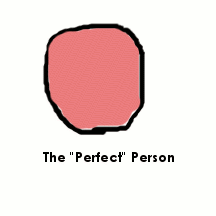 The
prevailing cultures in which we live have been sold the idea that there
is a "perfect" person. This idea pervades every aspect of our lives
and is defined by corporations, government, media, and ourselves. These
things set the boundary (that black one in the picture) where people
are expected to live within. You, with the help of all the institutions
we create to service or rule us, are expected to fill in the defined
space (the rose colored stuff) and be a competent, useful person, as
society defines this. Are you not smart enough? You need more school.
Are you not rich enough? You need to get a better job. Can you not
hear music in your ears everywhere you go? You need an mp3 player!
These are a few of the numerous expectations that society has for you
and to be a good member of society you are expected to meet them all as
an adult.
The
prevailing cultures in which we live have been sold the idea that there
is a "perfect" person. This idea pervades every aspect of our lives
and is defined by corporations, government, media, and ourselves. These
things set the boundary (that black one in the picture) where people
are expected to live within. You, with the help of all the institutions
we create to service or rule us, are expected to fill in the defined
space (the rose colored stuff) and be a competent, useful person, as
society defines this. Are you not smart enough? You need more school.
Are you not rich enough? You need to get a better job. Can you not
hear music in your ears everywhere you go? You need an mp3 player!
These are a few of the numerous expectations that society has for you
and to be a good member of society you are expected to meet them all as
an adult.
Society's expectations of what a person should be can be compared with a cookie cutter (the black line). People are expected to fill that cookie cutter completely, which is what a lot of people call being "well-rounded". The ideal goal in our society is to be well rounded, which is to have some ability or interest in all acceptable and anticipated areas and no serious deficits anywhere. Our society assumes that nearly everyone has (or should have) sufficient dough (or ability) to fill in the established cookie cutter expectations.
The Diabled Person
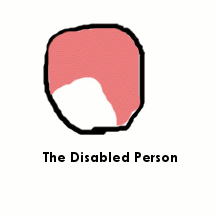 There
are some people who don't seem to have enough ability to meet society's
expectations. This is like having too little dough available to fill
up the cookie cutter form. Society has a label for that problem:
disability.
There
are some people who don't seem to have enough ability to meet society's
expectations. This is like having too little dough available to fill
up the cookie cutter form. Society has a label for that problem:
disability.
As a disabled person, you are deficient somewhere and that is a problem for everyone. Other people feel badly about the fact that your cookie cutter is not filled in everywhere and they want to "help". Society has decided to form entire industries for the purpose of trying to make disabled people more "perfect".
The Disabled Person With Remediation
>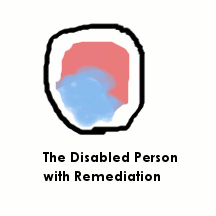 Our
society has decided that there is one way to fix disabled people:
remediation. If you cannot fill in the cookie cutter society has
designed, outside help is required in the form of medicine, psychology,
therapy, and other interventions. The goal is still to make a person
well-rounded, but if that cannot be accomplished, the most important
thing is to make the person "look" more round to outside observers. If a
disabled person is good at something, it is often ignored in favor of
working very hard to address the things a person is not good at.
Essentially, remediation is an attempt to steal dough from "unwanted"
places to fill in blank spots within cookie-cutter expectations.
Our
society has decided that there is one way to fix disabled people:
remediation. If you cannot fill in the cookie cutter society has
designed, outside help is required in the form of medicine, psychology,
therapy, and other interventions. The goal is still to make a person
well-rounded, but if that cannot be accomplished, the most important
thing is to make the person "look" more round to outside observers. If a
disabled person is good at something, it is often ignored in favor of
working very hard to address the things a person is not good at.
Essentially, remediation is an attempt to steal dough from "unwanted"
places to fill in blank spots within cookie-cutter expectations.
The Xenos Person
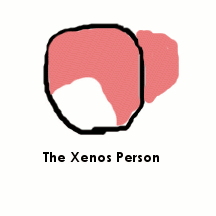 There
is an interesting sort of person that we will call Xenos. They are
obviously very different from "perfect" people, much like the disabled
are different. For the most part, a Xenos has the same amount of
ability as the "perfect" person, it is just distributed differently. A
Xenos is someone who focuses on one facet of life, often has greater
than normal ability and interest in it, and typically has shortcomings
in other areas of life. This person is often called "obsessive". For
the Xenos, this obsessive nature
is inherited (inborn) and cannot really be eliminated, though it can be hidden
by "behavioral training" or "healing" obvious and socially-disquieting
quirks out of a person.
There
is an interesting sort of person that we will call Xenos. They are
obviously very different from "perfect" people, much like the disabled
are different. For the most part, a Xenos has the same amount of
ability as the "perfect" person, it is just distributed differently. A
Xenos is someone who focuses on one facet of life, often has greater
than normal ability and interest in it, and typically has shortcomings
in other areas of life. This person is often called "obsessive". For
the Xenos, this obsessive nature
is inherited (inborn) and cannot really be eliminated, though it can be hidden
by "behavioral training" or "healing" obvious and socially-disquieting
quirks out of a person.
Fortunately for everyone, these Xenos people can often learn to steer their obsessive abilities toward interests that make the world a better place. It was Xenos-type people who created industrialization, telephones, the light bulb, radio, television, nuclear energy, computers, and ultimately iPods and iPhones, as examples. No one can doubt that people like Albert Einstein, Thomas Edison, and Bill Gates are pretty obsessive and odd and were able to do things that normal people cannot do or would have never thought of doing. Thankfully, many people were willing to ignore Einstein's unkempt hair and interesting mannerisms and focus instead on his theory of relativity!
Unfortunately for the Xenos, society doesn't like obsessiveness particularly. It gets in the way of making people well-rounded. Society's institutions (think about schools as an example) are designed to produce and service people whose ability and interests fit into the established societal cookie cutter. A Xenos person will have serious problems and cause serious problems when faced with a world (such as ours) that is heavily and inflexibly oriented toward institutional well-roundedness.
You can see in the picture above that there is some dough outside the black line. This is the indication of someone obsessively pursuing an interest or ability beyond what is considered normal and acceptable. To make up for things required to follow an obsession, material is missing from other facets of life. Often, the Xenos person is poor at mundane everyday tasks like hygiene and may lack common sense or common manners. In a typical Xenos, the basic dough (or level of interest or ability) is roughly the same as (or greater than that) in a "perfect" person; it is just distributed differently, some of it outside of the cookie cutter definition of what is normal and acceptable.
Our society grows more and more myopic and can only see value in what is considers to be normal and (frankly) profitable. If you were to cover over the dough that is outside the black circle in the picture, the Xenos person looks just like the disabled person - someone who doesn't have their cookie cutter filled in. To most people, a Xenos person is considered disabled, being practically unable to see ability outside of the boundaries of social normalcy.
The Xenos Person With Remediation
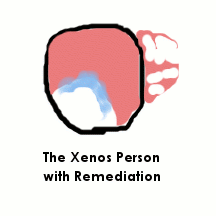 It
is important to remember that society controls not only the way things
are done but the institutions created to do and run things. There is
really only one cookie-cutter definition of normal and there is really
only one established way of dealing with things that are not normal:
remediation. Therefore, Xenos people end up being put through the same
people, institutions, and processes that disabled people face. "Johnny,
I want you to stop designing the next Mars rover and sit with the
therapist and practice blowing your nose properly. It is much more
important to fit in with the other kids than it is to win the Nobel
Prize in physics."
It
is important to remember that society controls not only the way things
are done but the institutions created to do and run things. There is
really only one cookie-cutter definition of normal and there is really
only one established way of dealing with things that are not normal:
remediation. Therefore, Xenos people end up being put through the same
people, institutions, and processes that disabled people face. "Johnny,
I want you to stop designing the next Mars rover and sit with the
therapist and practice blowing your nose properly. It is much more
important to fit in with the other kids than it is to win the Nobel
Prize in physics."
Most disability professionals would excitedly attack that unsightly blob of "wasted" ability outside the established circle in the picture above and chew up someone's childhood or entire life trying to fill in that missing place in the cookie cutter that dictates how well one holds their fork. Thank goodness there were no therapists engaged in fixing Einstein - who knows how much we would have lost!
It is important to note that there can be truly disabled people among the Xenos, just as there are among typical people. I am sure you can see the picture in your mind of the cookie-cutter and a small amount of cookie dough stretched out toward some obsession, resulting in very little lying inside the circle. There is some small need for therapists and doctors and psychologists for those people, with an understanding that you cannot get the obsession out of the Xenos and focus can be set on handling communication problems and other things that can help the Xenos achieve their potential to go where no normal person could ever go!